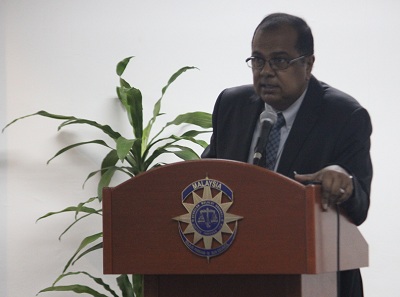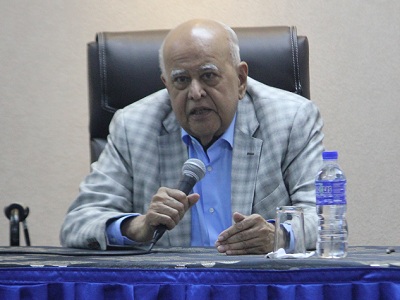Article contributed by Najwa Hamid, Officer, Bar Council Syariah Law
Committee; and photos by Jul Indra Tofan, Administrative Assistant, Bar
Council
On 14 Apr 2018, the Bar Council Syariah Law Committee (“SLC”) organised
a forum entitled “Administration of Islamic Law in Malaysia and Its
Challenges” at the Bar Council Raja Aziz Addruse Auditorium.
The forum was timely, since the civil–Syariah jurisdictional conflict
remains an unsettled issue, as reflected in recent cases.
The objectives of the forum were as follows:
(1) To raise awareness regarding the existence and
management of cases that involve an overlap between civil and Syariah
jurisdictions; and
(2) To discuss how to move such cases forward while
upholding the Federal Constitution.
The forum commenced with welcoming remarks by Kuthubul Zaman Bukhari,
Chairperson of SLC, who also acted as a moderator for this forum.
He then introduced Fahda Nur Ahmad Kamar, member of SLC. Her talk
was an introduction on the administration of Islamic law in Malaysia.


Fahda Nur stated that Malaysia has a legal system that is comprised of
civil courts and Syariah courts. In her presentation, Fahda Nur
discussed the areas of law that are “hybrid” in nature. The
following examples, inter alia,
were cited:
| Areas of Law |
Jurisdiction |
Issues |
Example
of Act /
Enactment on the Matter |
| Property / Inheritance |
Syariah (Civil) |
•
Probate • Wills • Administration of Estate • Gifts / Hibah • Harta Sepencarian • Trust / Nomination • Zakat |
•
Probate and Administration Act 1959 • Islamic Family Law (Federal Territory) Act 1984 • Islamic Family Law (State of Selangor) Enactment 2003 • Civil Law Act 1956 • Small Estates (Distribution) Act 1955 • Muslim Wills (Selangor) Enactment 1999 • Muslim Wills (Negeri Sembilan) Enactment 2004 • Gazetted Fatwa • Administration of the Religion of Islam (State of Selangor) Enactment 2003 • Trustee Act 1949 (excludes Waqf) • National Land Code 1965 |
| Wakaf / Trust |
Syariah (Civil) |
•
Ownership of Wakaf |
•
Gazetted Fatwa • National Land Code 1965 • Administration of Islamic Law (Federal Territories) Act 1993 • Administration of the Religion of Islam (State of Selangor) Enactment 2003 • Wakaf (State of Selangor) Enactment 2015 |
| Criminal |
Syariah (Criminal) |
•
Apostasy • Conversion • Cross–Dressing • Incest • Sodomy • Indecent Acts in Public Places • Other Syariah Criminal Offences |
•
Syariah Criminal Offences (Selangor) Enactment 1995 • Syariah Criminal Offences (Federal Territories) Act 1997 • Penal Code |
Fahda Nur concluded her session by citing Latifah bte Mat Zin v
Rosmawati bte Sharibun & Anor [2007] 5 MLJ 101, where the
landmark
Federal Court decision clarifies the law for both Muslims and
non–Muslims, and puts into perspective what matters may be properly
dealt with by the respective courts.
The two panellists for the forum were Gopal Sri Ram, a former Federal
Court Judge and currently a Member of the Bar; and Mohamed Haniff b
Khatri Abdulla, Member of the Bar. They were invited to discuss
the case of Indira Gandhi A/P Mutho
v Pengarah Jabatan Agama Islam
Perak & 2 Ors [Civil Appeal No. 01(f)–17–06/2016(A)].

Gopal Sri Ram commented on the decision in that case, which affirmed
that the Federal Constitution cannot be violated through any
amendments. He quoted Article 4(1) of the Federal Constitution,
which states that the Federal Constitution “is the supreme law of the
Federation and any law passed after Merdeka Day which is inconsistent
with the Constitution shall, to the extent of the inconsistency, be
void”.
Gopal Sri Ram also cited the judgement in Che Omar Che Soh v Public
Prosecutor [1988] 2 MLJ 55, in which Lord President Tun Salleh
Abas (as
he was then), when delivering the judgement, stated that “we have to
set aside our personal feelings because the law in this country is
still what it is today, secular law, where morality not accepted by the
law is not enjoying the status of law. Thus, despite our
differences in belief, we should at least agree to uphold the supremacy
of the Federal Constitution”.

Mohamed Haniff b Khatri Abdulla opined that the Federal Court judgement
in the Indira Gandhi case did not clearly distinguish between the
limitations of the Federal Court jurisdiction and Islamic laws, which
would lead members of the public to believe that the children were not
Muslims. In his view, from the Islamic law perspective, they
remain as Muslims.
Mohamed Haniff b Khatri Abdulla proposed that a Royal Committee be
established in order to overcome the problem of conflict of
jurisdiction in all areas. The Royal Committee should consist of
three eminent persons, two of whom should preferably be a former judge,
a Mufti, or an Islamic scholar; and lastly, a recognised representative
from the community. He suggested that the proposed Royal
Committee should sit for about three years to study the matter, in
order to resolve this problem gradually and globally.
The three–hour forum, which carried two Continuing Professional
Development (“CPD”) points, saw participation from 35 Members of the
Bar, pupils in chambers and members of the public.





